Related Research Articles
A tort is a civil wrong that causes a claimant to suffer loss or harm, resulting in legal liability for the person who commits the tortious act. Tort law can be contrasted with criminal law, which deals with criminal wrongs that are punishable by the state. While criminal law aims to punish individuals who commit crimes, tort law aims to compensate individuals who suffer harm as a result of the actions of others. Some wrongful acts, such as assault and battery, can result in both a civil lawsuit and a criminal prosecution in countries where the civil and criminal legal systems are separate. Tort law may also be contrasted with contract law, which provides civil remedies after breach of a duty that arises from a contract. Obligations in both tort and criminal law are more fundamental and are imposed regardless of whether the parties have a contract.
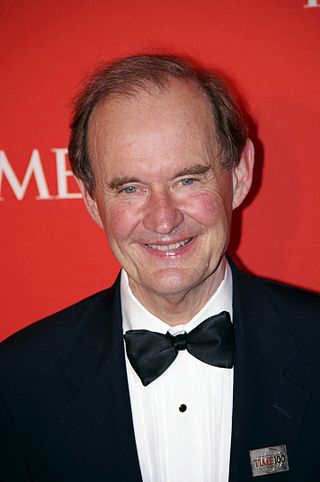
David Boies is an American lawyer and chairman of the law firm Boies Schiller Flexner LLP. Boies rose to national prominence for three major cases: leading the U.S. federal government's successful prosecution of Microsoft in United States v. Microsoft Corp., his unsuccessful representation of Democratic presidential candidate Al Gore in Bush v. Gore, and for successful representation of the plaintiff in Hollingsworth v. Perry, which invalidated California Proposition 8 banning same-sex marriage. Boies has also represented various clients in US lawsuits, including Theranos, tobacco companies, Harvey Weinstein, and Jeffrey Epstein's victims including Virginia Roberts Giuffre.
Hustler Magazine, Inc. v. Falwell, 485 U.S. 46 (1988), is a landmark decision by the Supreme Court of the United States in which the Court held that parodies of public figures, even those intending to cause emotional distress, are protected by the First and Fourteenth Amendments to the U.S. Constitution.
Consent occurs when one person voluntarily agrees to the proposal or desires of another. It is a term of common speech, with specific definitions as used in such fields as the law, medicine, research, and sexual relationships. Consent as understood in specific contexts may differ from its everyday meaning. For example, a person with a mental disorder, a low mental age, or under the legal age of sexual consent may willingly engage in a sexual act that still fails to meet the legal threshold for consent as defined by applicable law.
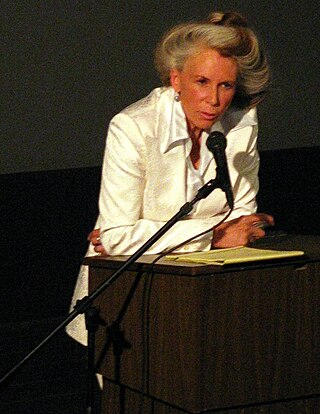
Catharine Alice MacKinnon is an American feminist legal scholar, activist, and author. She is the Elizabeth A. Long Professor of Law at the University of Michigan Law School, where she has been tenured since 1990, and the James Barr Ames Visiting Professor of Law at Harvard Law School. From 2008 to 2012, she was the special gender adviser to the Prosecutor of the International Criminal Court.
William Lloyd Prosser was the Dean of the School of Law at UC Berkeley from 1948 to 1961. Prosser authored several editions of Prosser on Torts, universally recognized as the leading work on the subject of tort law for a generation. It is still widely used today, now known as Prosser and Keeton on Torts, 5th edition. Furthermore, in the 1950s, Dean Prosser became Reporter for the Second Restatement of Torts.
A sex offender is a person who has committed a sex crime. What constitutes a sex crime differs by culture and legal jurisdiction. The majority of convicted sex offenders have convictions for crimes of a sexual nature; however, some sex offenders have simply violated a law contained in a sexual category. Some of the serious crimes which usually result in a mandatory sex-offender classification are sexual assault, statutory rape, bestiality, child sexual abuse, incest, rape, and sexual imposition.

Alan Morton Dershowitz is an American lawyer and law professor known for his work in U.S. constitutional law and American criminal law. From 1964 to 2013, he taught at Harvard Law School, where he was appointed as the Felix Frankfurter Professor of Law in 1993. Dershowitz is a regular media contributor, political commentator, and legal analyst.

Jeffrey Edward Epstein was an American financier and sex offender. Born and raised in New York City, Epstein began his professional life as a teacher at the Dalton School despite lacking a college degree. After his dismissal from the school in 1976, he entered the banking and finance sector, working at Bear Stearns in various roles before starting his own firm. Epstein cultivated an elite social circle and procured many women and children whom he and his associates sexually abused.

Tort reform consists of changes in the civil justice system in common law countries that aim to reduce the ability of plaintiffs to bring tort litigation or to reduce damages they can receive. Such changes are generally justified under the grounds that litigation is an inefficient means to compensate plaintiffs; that tort law permits frivolous or otherwise undesirable litigation to crowd the court system; or that the fear of litigation can serve to curtail innovation, raise the cost of consumer goods or insurance premiums for suppliers of services, and increase legal costs for businesses. Tort reform has primarily been prominent in common law jurisdictions, where criticism of judge-made rules regarding tort actions manifests in calls for statutory reform by the legislature.

Ingraham v. Wright, 430 U.S. 651 (1977), was a United States Supreme Court case that upheld the disciplinary corporal punishment policy of Florida's public schools by a 5-4 vote. The judgment specified that such corporal punishments have no prohibition in public schools unless those punishments are “degrading or unduly severe”.
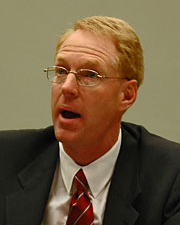
Paul George Cassell is a former United States district judge of the United States District Court for the District of Utah, who is currently the Ronald N. Boyce Presidential Professor of Criminal Law and University Distinguished Professor of Law at the S.J. Quinney College of Law at the University of Utah. He is best known as an expert in, and proponent of, victims' rights.
An obscenity is any utterance or act that strongly offends the prevalent morality of the time. It is derived from the Latin obscēnus, obscaenus, "boding ill; disgusting; indecent", of uncertain etymology. Generally, the term can be used to indicate strong moral repugnance and outrage in expressions such as "obscene profits" and "the obscenity of war". As a legal term, it usually refers to descriptions and depictions of people engaged in sexual and excretory activity.
Child pornography is erotic material that depicts persons under the age of 18. The precise characteristics of what constitutes child pornography varies by criminal jurisdiction.
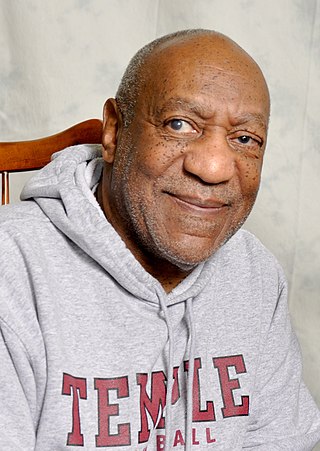
In late 2014, multiple allegations emerged that Bill Cosby, an American media personality, had sexually assaulted dozens of women throughout his career. Cosby was well known in the United States for his eccentric image, and gained a reputation as "America's Dad" for his portrayal of Cliff Huxtable on The Cosby Show (1984–1992). He received numerous awards and honorary degrees throughout his career, many of which have since been revoked.

Anita Nancy Bernstein is an American tort law scholar, with expertise in feminist jurisprudence and legal ethics. She is the Anita and Stuart Subotnick Professor of Law at Brooklyn Law School.
There have been many reported cases and accusations of sexual abuse in the American film industry reported against people related to the medium of cinema of the United States.

Feminist interventions in the philosophy of law concern the examination and reformulation of traditional legal systems in order to better reflect the political, social, and economic concerns of women---which also includes various other minority and ethnic groups. Though it draws heavily from feminist legal theory, feminist interventions in the philosophy of law differs from the more common feminist jurisprudence as it also seeks to explain the justification that a government has in interfering with the lives of its citizenry. Accordingly, then, feminist interventions in legal philosophy specifically addresses the relationship and rationale between a judicial system's exercise of power and its effects on female citizens. While particular views vary greatly, most feminist interventions in the philosophy of law operate under a belief that many contemporary legal systems are predicated on patriarchal notions of masculinity that result in a system of deeply-rooted bias and inequality.
Spencer T. Kuvin is an American lawyer based in Florida. He is best known for representing victims of billionaire financier Jeffrey Epstein.
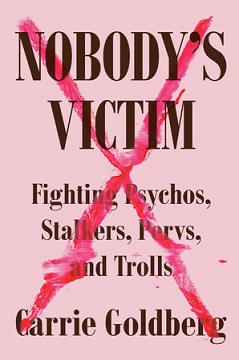
Nobody's Victim: Fighting Psychos, Stalkers, Pervs, and Trolls is a 2019 book by Carrie Goldberg, co-written with Jeannine Amber. It describes incidents of sexual violence experienced by Goldberg's clients and herself, as well as other famous cases. The acts of violence include rape and sexual assault, revenge porn, "doxing", "swatting", "sextortion", and abusive messages. Goldberg categorizes perpetrators as "assholes", "psychos", "pervs" or "trolls" depending on their nature, though "assholes" was omitted in the book's subtitle to avoid profanity.
References
- ↑ Deana Sacks Pollard website at Thurgood Marshall School of Law, Texas Southern University retrieved 2nd Nov 2015 [ permanent dead link ]
- ↑ Deana Pollard, Regulating Violent Pornography, 43 Vanderbilt Law Review 125 (1990).
- ↑ Deana Pollard Sacks, Sex Torts, 91 Minnesota Law Review 791 (2007).; Deana Pollard Sacks, Intentional Sex Torts, Fordham Law Review (2008) .
- ↑ C-SPAN video of Pollard Sacks talk at Harvard Law School on implicit bias
- ↑ Deana Pollard Sacks, State Actors Beating Children: A Call for Judicial Relief, 42 U.C. Davis Law Review (2009)